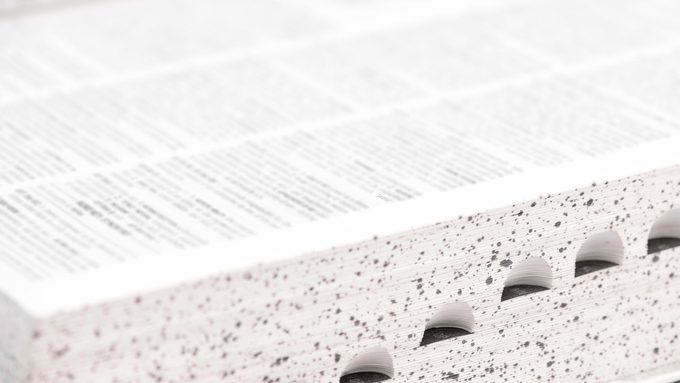The dictionary isn’t forever. Here’s the lowdown on why certain words are not in the dictionary and how they got removed.

Here’s How Words Not in the Dictionary Anymore Got Removed

You can’t call someone a frutescent snollygoster anymore—at least not officially. Those words have been deleted from the dictionary, so you’ll have to come up with alternate terms to describe a shrubby, unscrupulous politician. And those words aren’t alone. Each year, a slew of old-timey words—still known and used by many, but not enough—don’t make the cut to the next edition. But exactly why are some words not in the dictionary? And if it boils down to usage, how is it measured?
If you, too, have been left puzzled by words not in the dictionary—even ones you swear are real—you’re in the right place! Turns out, just as new words are added to the dictionary, there’s a rigorous process for deleting words from it as well. And most dictionaries have justifiable reasons for why they make these deletions (regardless of whether most word wizards like it or not).
Read on to understand why and how some words are removed from the dictionary.
Get Reader’s Digest’s Read Up newsletter for more knowledge, tech, travel, cleaning, humor and fun facts all week long.
Why are words removed from the dictionary?
The dictionary is a steadily enlarging volume, with thousands of new words being added—and old words removed—each year. And the reason why these additions and deletions are necessary include:
- The evolution of language: The English language constantly evolves and changes. Some new words arise from emerging and expanding disciplines. Others come from pop culture, which gives rise to slang that sometimes goes mainstream. The influx of these new and popular words often leaves less and less space for older ones. Imagine how cumbersome it’d be to navigate your way through a dictionary that had every word that ever existed. (Not to mention the size! Far from a pocket dictionary.)
- The evolution of meanings: Definitions of existing words also change and shift with time, so common words gain (or lose) meanings and nuances. Take the word gooseberry for example. It’s both a fruit and an “indulgent chaperone” in British English. As the word began losing its second meaning, it was omitted from Webster’s Third New International Dictionary in 1961. You won’t find the “chaperone” definition in Merriam-Webster either.
- The obsolescence of words: Also on the list of words not in the dictionary are those that become obsolete (with a select few being replaced with something completely new). Case in point: When was the last time you read “Vitamin G” on the nutrient breakdown of a milk product? Probably before “riboflavin” took its place in the 1930s.
As a result of such changes, words often get removed from the dictionary, though this doesn’t happen nearly as frequently as they’re added.
How many words are removed from the dictionary each year?

Very few words actually get removed from the dictionary entirely. Instead, they’ll stay in but get categorized in a different way. The unabridged Collins English Dictionary uses labels like “obsolete,” “archaic” or “old-fashioned” to designate the kind of words that are no longer in circulation. Alternatively, the Oxford English Dictionary uses labels like “Now hist.” and “Obs.” to indicate that a word is historical or obsolete.
Plenty of bygone words are no longer in use but still appear in various dictionaries. Historians and scholars may need to know the origins and definitions of old, obscure words while doing research, which is why some out-of-date words remain.
Who decides which words to delete?
Lexicographers, aka dictionary editors, decide which words make it into the dictionary—and also which ones are ready for deletion.
While adding a word to the dictionary is a rigorous process, it’s even more difficult for a word to get deleted. Lexicographers maintain and study vast language databases to keep up to date on the words in circulation across various media: from digital platforms like social media, blogs and emails to more formal outlets like magazines, newspapers and academic journals, not to mention TV and radio. Most words that are marked for deletion will remain in online dictionaries (or will be removed from one dictionary but remain in others) even after they’re cut from print editions.
How are words removed from the dictionary?
The Oxford English Dictionary covers the English language over the past 1,000 years and is considered definitive and authoritative. However, there are many dictionaries that are reliable and trustworthy, and each has its own process for additions and removals (even the ones that are online only). Here’s how a few leading dictionaries make the distinction:
American Heritage Dictionary
The American Heritage Dictionary uses 1755 as the cut-off year to indicate the difference between words that are obsolete versus archaic. What’s the difference? It defines an archaic word as one with “sporadic” print evidence of its use after 1755 and an obsolete word as one with “little or no” evidence of use since then.
Merriam-Webster
Merriam-Webster also distinguishes between its use of the labels “obsolete” and “archaic.” Archaic terms are those that are rarely used today but still understood, while obsolete words have fallen completely out of use. If you see either label in the dictionary, it means the word has mostly vanished from modern conversation.
Its collegiate edition, like the American Heritage Dictionary, makes this distinction on the basis of the year 1755. But why? It’s because 1755 saw the release of Samuel Johnson’s revolutionary dictionary, the first to include not just scholarly terms but everyday words too, illustrated with literary quotes and setting the gold standard for modern English dictionaries.
Dictionary.com
Dictionary.com, an online-only dictionary, separates archaic and obsolete words by when they faded from use. But its criterion for archaic words differs slightly from the two print dictionaries discussed above. Relatively familiar archaic words, like thou, were still common around the late 1900s and, although labeled “archaic,” might show up for effect today. Obsolete words, however, vanished by the mid-1700s and are now mostly museum pieces of language.
These are often the types of words that won’t make it into the print editions of dictionaries. Every time there’s a new print edition, inevitably, some words will have to be cut so that it stays relevant and doesn’t become too unwieldy.
What are some words that’ve recently been given a pink slip by the dictionary? Let’s find out.
What are some outdated words not in the dictionary anymore?
In recent years, some words hit the chopping block in Merriam-Webster Collegiate Dictionary, meaning they’re no longer included in the print edition due to falling out of popular use. These include:
- Vitamin G: It used to be the term for what’s now known as riboflavin.
- Snollygoster: An unscrupulous politician used to be known as a snollygoster.
- Hodad: It comes from the 1960s and basically means a surfer poseur.
- Frutescent: An adjective to describe being shrub-like
- Sternforemost: Sternforemost is no longer necessary to describe a ship moving backward; it’s an old nautical term from the 1800s.
Just like the words in the first dictionary that don’t exist anymore, each of these terms has the necessary attribute of not being useful or used anymore. (Don’t feel too bad for these terms; they’re still available in Merriam-Webster online.)
How do dictionary additions and deletions reflect social changes?
The dictionary is the foundation of language, and the words in it not only help readers learn new meanings but also actively shape our social reality. The issue: That foundation isn’t always neutral (or on the right side of history). After all, they’re written by people, and people (consciously or unconsciously) bring their perspectives with them. As a result, scholars point out that the dictionary can reflect cultural bias.
Case in point: A 2019 petition with 30,000 signatures called for the Oxford English Dictionary to remove sexist language and definitions, especially those entries under the word woman. In some dictionaries and on some websites, synonyms for woman include words like bitch, piece, bit, mare, baggage, wench, petticoat, frail and biddy. You get the idea.
So the next time you’re looking up a word that’s not in the dictionary, don’t assume it’s not real. Take a moment to inspect whether its context and usage are one with the times or not. And if all else fails, flip open an unabridged edition—you might be surprised by what is in there.
Why trust us
At Reader’s Digest, we’re committed to producing high-quality content by writers with expertise and experience in their field in consultation with relevant, qualified experts. We rely on reputable primary sources, including government and professional organizations and academic institutions as well as our writers’ personal experiences where appropriate. We verify all facts and data, back them with credible sourcing and revisit them over time to ensure they remain accurate and up to date. Read more about our team, our contributors and our editorial policies.
Sources
- Merriam-Webster: “If a word is not in the dictionary, does that mean it isn’t a real word?”
- Merriam-Webster: “Word Matters Podcast – How Words Are Dropped from the Dictionary”
- Quartz: “The complex process that dictionaries use to decide which words are obsolete”
- ThoughtCo.: “An Introduction to Obsolete Words”
- Merriam-Webster: “‘Archaic’ and ‘Obsolete’: What’s the difference?”
- Dictionary.com: “The Dictionary Difference Between Archaic And Obsolete”
- The Atlantic: “How to Edit a Dictionary”
- Tech Times: “Happy Birthday Noah Webster! Here are 9 words removed from Merriam-Webster’s Collegiate Dictionary”
- The Guardian: “Sexism in dictionaries: why are ‘hussy, baggage and filly’ still used to describe a woman?”
- USA Today: “Oxford Dictionary’s synonyms for ‘woman’ are sexist. 30,000 petition to change it”
- Good Morning America: “Is the dictionary sexist? Petition calls for Oxford English Dictionary to remove sexist terms for women”





















